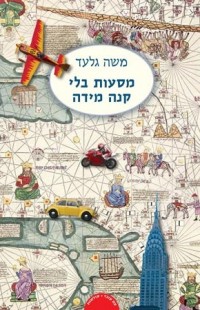'Journeys Without Scale' fails to fulfill its promise. It is not deep enough to satisfy the curiosity of die-hard map lovers - and it is not tight enough to make the reader fall in love with the characters that appear in it.

The love for maps is a special love.
Those who like music, for example, usually like to listen to a certain genre from the wide variety of existing genres. Map lovers, on the other hand, love maps. Of any kind - and it doesn't matter which region of the country is drawn on them. It could be, for that matter, the London Underground map. They like the maps because they are there. I know this from experience: I have a map of the Straits of Tiran hanging in my study as a decoration, although I have no particularly strong feelings for the southern end of the Red Sea.
It is evident in Moshe Gilad, the author of the book 'Journeys Without Scale' (published by Am Oved, 2010, edited by Thelma Admon) that he loves maps. 'Travels' is a collection of personal and humorous travel stories each dealing with a different type of map: a geographic map, a railway map, a climate map, even a Bob Marley map (yes, there is one). Between stories Moshe gives examples of maps of considerable historical importance and few details about the personalities who created them. Such a fusion of historical-factual content and personal-humorous content has tremendous potential - but unfortunately, this potential is not realized in the book.
The personal stories, each on their own, are quite entertaining. Here is a representative example:
Gilad tells about a world map drawn by the Jewish cartographer Avraham Karshaksh on the island of Palma de Mallorca in 1377. Karshaksh was considered one of the great map painters of his time, and when the Spanish prince Don Juan wanted to purchase an up-to-date world map for himself, he knew who to turn to. Karshkesh combined the knowledge accumulated by the many sailors of Palma de Mallorca - and also knowledge from a new and fascinating source: the descriptions of Marco Polo, the famous European merchant who introduced us to China and the Far East.
Some time after receiving Karskash's world map, Don Juan sent it to the King of France - and there it is to this day, in the National Library of Paris.
Gilad tells about Yaakov Ribos, one of his acquaintances, who traveled by train from Barcelona to Paris. Rivos, an expert on ancient maps, was on his way to give a lecture on the Karskash map.
Suddenly three men of Italian origin boarded the train. One of the three asked Jacob if he knew, by any chance, how to get to the National Library in Paris. They have an important interest in the ancient map department.
When Jacob asked them how he could help them in the matter, the three told him that they were the distant descendants of Marco Polo. They are on their way to Paris to claim possession of Karskash's map - yes, the same map that Jacob was about to lecture on. According to them, the information provided by Polo to Abraham Karskesh is a family property, and the ancient map belongs to them by right. One train ride that is all a rare and fascinating coincidence.
Stories such as these are certainly entertaining, but Journeys Without Scale suffers from two fundamental weaknesses.
The chapters dealing with history lack depth. In particular, there is not enough historical background on each map to give the reader a real sense of its importance on the timeline. We understand that Karskash's map is one of the most important maps of its time - but why? What is special about it compared to other maps? What does it have, which places and which lines, that are not on other maps? This issue comes up again and again: the map the chapter deals with is at the center of things, but is devoid of any historical background that would help the reader understand what all the fuss is about.
The second weakness is related to the humorous personal stories. Books written in this style can be wonderful, when well written. A classic example is 'All creatures great and small', by James Herriot (the pen name of the author James Alfred Waite). Countless vets-to-be grew up on the amusing, whimsical and charming stories of the rural vet in XNUMXs Yorkshire.
The great thing about Herriot's book is the way in which he paints, through a mosaic of dozens of small and independent stories, one complete picture of Yorkshire with its fascinating types. In 'Travels', however, the picture remains a puzzle. There is no connection between story and story. The humor is accidental, the characters flutter and disappear. Even the writer's character does not manage to make skin and sinew: we have no identifying information about him and the reason for his many trips around the globe. Most of the time, the feeling the reader gets is like bursting into a private party: everyone seems to know what's going on, except you.
In conclusion, 'Journeys Without Scale' fails to fulfill its promise. It is not deep enough to satisfy the curiosity of die-hard map lovers - and it is not tight enough to make the reader fall in love with the characters that appear in it. Treasure is not found on this map.

One response
But I think that's also how America was discovered, isn't it:?)